 Image search results - "pottery" Image search results - "pottery" |
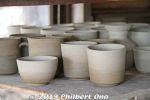
Local pottery called Izura Tenshin-yaki started about 25 years ago by the local Chamber of Commerce. Clay called "gairome" (蛙目) found locally is used. The clay is found in this area under the coal deposits. They collect the clay already exposed on the ground (no digging). This type of clay contains quartz, but the large quartz pieces are removed for pottery.
|
|
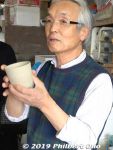
This is Kikuchi Hidetoshi, a local potter who, along with his wife Mie, taught us how to make Izura Tenshin-yaki pottery (五浦天心焼). They moved here in 1998.The Kikuchis are one of several Tenshin-yaki potters in Kita-Ibaraki.
|
|
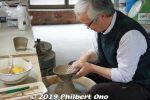
We visited his modest studio for a hands-on pottery lesson. First he demonstrated what we have to do. He made it look so quick and easy. 土の夢陶房 (菊池 秀利・美恵)
|
|
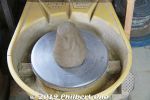
We each got a clump of clay, enough to make several cups or bowls.
|
|
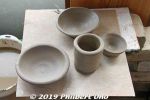
From one clump of clay, I made all these pieces. Oh yeah, it's easy. Anybody can do it. It costs a few thousand yen per piece to color and fire. It is sent to us later.
|
|
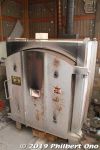
Kiln is in a another small building.
|
|
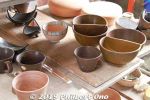
Kikuchi's pottery.
|
|

We were treated to refreshments served in the Kikuchis' pottery. Confection of azuki bean soup with a piece of mochi. Thank you to Hidetoshi and Mie Kikuchi (菊池 秀利・美恵) for teaching us pottery and hosting us in their beautiful, Japanese-
|
|

If you go to Konki Senshoku, you might as well also see Shimoda-yaki 下田焼 pottery down the road in the Konan Traditional Crafts Hall (Dento Kogei Kaikan). 湖南市伝統工芸会館 MAP
|
|

Shimoda-yaki is characterized by deep-blue colors on white. They exhibit and sell Shimoda-yaki pottery and also offer pottery lessons. You should make reservations at 0748-72-7444. Take a bus from Mikumo Station and get off at Higashi Iwane 東岩根.
|
|
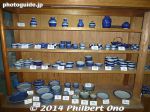
Shimoda-yaki pieces are designed for practical, everyday use.
|
|

Shimoda-yaki started in the 18th century using soil in the Shimoda area of Konan and techniques from Kyoto. Today, only one man makes it, and he has no successor. Pottery lessons cost 3500 yen if you want to make the piece yourself.
|
|
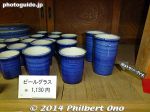
Shimoda-yaki cups
|
|

The hall has a few exhibition rooms.
|
|
|

Next door to the Shimoda-yaki hall is this hall for trying traditional crafts. たくみの家
|
|
|
|

If you like the tanuki raccoon dog, this is the place to be.
|
|
|
|
|
|

The tanuki have different faces and doing different things, even karaoke. Didn't see any looking like a photographer though.
|
|

Tanuki faces. This one is probably the most typical in the modern age.
|
|
|
|
|
|
|
|
|
|
|

Shigaraki tanuki is said to bear Eight Lucky Omens (八相縁起).Shigaraki tanuki is said to bear Eight Lucky Omens (八相縁起). 1. The hat is protection from unexpected disasters. 2. The smiling face is for affability, 3. The large eyes is for seeing the situation and making correct and considerate decisions, 4. The large belly is for being calm as well as bold, 5. A sake flask in the left hand for innate virtue, 6. An unpaid bill in the left hand symbolizes trust, 7. Large gonads between the legs which is the money bag for prosperity, and 8. A thick tail for reliability and stability no matter what.
|
|

Sports tanuki
|
|
|
|

Mail box
|
|

Owls too
|
|

Frog is "Kaeru" which means to "return." A popular ornament at house entrances (exits) and gardens.
|
|

This frog will supposedly have your money "returned."
|
|

Pig
|
|

Bowls
|
|

Prices are quite reasonable. They sell pottery for any type of budget.
|
|

Vases
|
|
|

Bargains to be found.
|
|

Pottery vendor
|
|
|
|

Lemme outta here...
|
|
|
|

Shigaraki Ceramic Cultural Park also has pottery kilns. Here's one "Anagama" cave kiln.
|
|

Pottery kilns require large amounts of wood.
|
|

"Anagama" kiln diagram and explanation in Japanese and English.
|
|

Noborigama sloping kiln 登り窯
|
|

"Anagama" kiln.
|
|

"Noborigama" sloping kiln 登り窯
|
|

Side entrances of noborigama kiln. 登り窯
|
|

Inside the kiln. This one was open and empty, but some were closed and you could feel the warmth on the door.
|
|

Inside a side entrance of a noborigama kiln. 登り窯
|
|

"Noborigama" kiln explanation in Japanese and English. 登り窯
|
|

"Noborigama" kiln
|
|

Ceramic seats
|
|

More outdoor ceramic art. This is outside the Institute of Ceramic Studies where invited artists in residence create and do research and workshops and lectures are held.
|
|

Inside Tanuki-kan store.
|
|
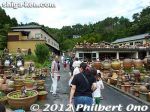
Shigaraki has a good number of pottery centers and Sotoen (宗陶苑) is major one. I visited for the first time in Aug. 2012. It covers a large ceramic park-like area.
|
|
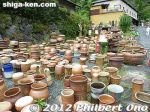
Sotoen has a very large number of Shigaraki pottery pieces outside in park-like tract. All for sale. Shigaraki ware is known for its weather-resistance, so they are suited for gardens and outdoor use.
|
|

Racks and racks of Shigaraki tanuki or racoon dogs.
|
|
|
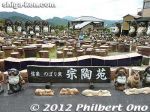
Photo op at Sotoen. They got almost everything you can imagine. The giant tanuki is priced as much as 700,000 yen.
|
|

Overview of the heart of Sotoen.
|
|
|
|
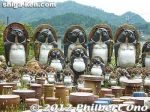
Tanuki for sale at Sotoen, Shigaraki.
|
|
|
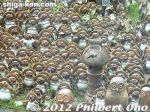
Smaller tanuki cost a few thousand yen.
|
|

They also have owls. This one has a camera.
|
|
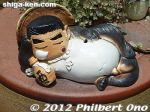
Crayon no Shinchan.
|
|
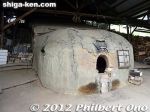
Sotoen's main attraction is this noborigama or sloping kiln. Japan's oldest noborigama. The bottom chamber is the furnace where they burn wood. 登り窯
|
|

Sotoen's noborigama kiln is 15 meters wide, 30 meters long, and 3.5 meters high. It has eleven chambers going up a slope. 登り窯
|
|
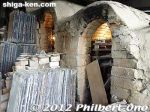
The heat from the furnace at the bottom chamber rises and seeps into all the chambers. 登り窯
|
|
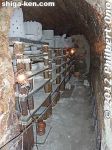
A noborigama chamber. The chambers get larger toward the top of the noborigama kiln. 登り窯
|
|
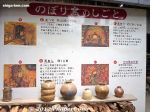
"Noborigama" kiln explanation in Japanese. It takes 40-50 days to fill the kiln, and 7-10 days to fire. 登り窯
|
|
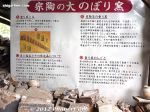
"Noborigama" kiln explanation in Japanese
|
|

The top of the noborigama kiln.
|
|
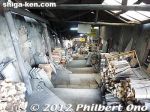
Steps along the side of the noborigama kiln.
|
|
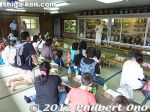
A talk about Shigaraki ware at Sotoen.
|
|
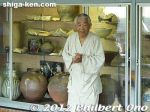
A talk about Shigaraki ware at Sotoen.
|
|
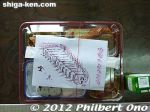
Bento lunch at Sotoen.
|
|
|
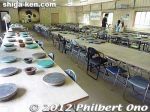
Another highlight of Sotoen was a pottery lesson for beginners. They have a huge pottery classroom.
|
|

First, an instructor demonstrated the basics of pottery making with a block of clay. Easy enough for anyone to make a simple bowl or cup.
|
|

The instructor showed how to smooth the top edge with a wet cloth.
|
|

Here's our block of Shigaraki clay.
|
|
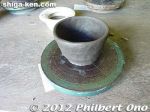
After maybe 20-30 min., my little bowl.
|
|
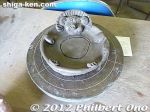
Another person got more creative. We were going to see the result in Sept.
|
|

Sotoen gift shop.
|
|
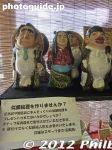
They even can make Shigaraki figurines based your likeness if you give them photos of your face.
|
|
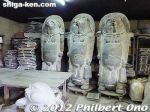
Large tanuki.
|
|
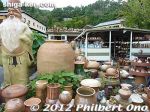
Pottery everywhere at Sotoen.
|
|
|
|
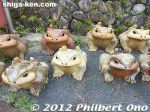
Frogs are another auspicious pottery piece. Sotoen Web site: shigarakiyaki.co.jp
|
|

If you go to Shigaraki by car, you will see large pottery shops along the road catching your eye with giant tanuki and small tanuki armies.
|
|

Giant tanuki dressed as a Yokozuna grand champion sumo wrestler.
|
|

Inside a large pottery shop.
|
|

This pottery shop also offers pottery classes.
|
|
|
|
|
|